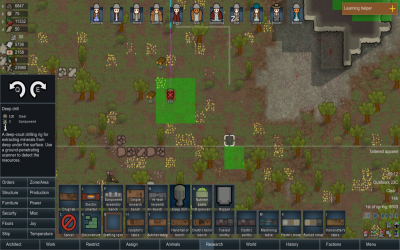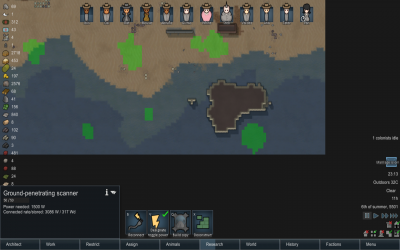Difference between revisions of "Deep drill"
PigeonGuru (talk | contribs) |
PigeonGuru (talk | contribs) |
||
| Line 33: | Line 33: | ||
=== Operation === | === Operation === | ||
| − | A drill is operated by [[Menus#Mine|miners]]. The drill's inspection pane shows what resource is below ({{lc:{{#ask: [[Category:Metal]]}}, [[chemfuel]] or [[jade]]}}). Cells will turn from green to yellow and then blank as they are depleted. Each cell contains 150 resources | + | A drill is operated by [[Menus#Mine|miners]]. The drill's inspection pane shows what resource is below ({{lc:{{#ask: [[Category:Metal]]}}, [[chemfuel]] or [[jade]]}}). Cells will turn from green to yellow and then blank as they are depleted. Each cell contains a total of 150 resources; if all 9 cells of a 3x3 grid are mined, that is a maximum of 1,350 resources. This number is however dependent on the miner's mining yield, so the values may be slightly lower. Drill operation can be suspended by marking the drill as forbidden or turning off its power. |
| − | Drills will produce stone chunks if there are no other materials below them | + | Drills will produce stone chunks if there are no other materials below them. Only one type of stone chunk is produced on each map. To prevent pawns from continuing to drill stone undesirably, a drill that has exhausted all other resources will automatically be marked "forbidden" with a notification to the player. |
Each extraction takes a base of {{ticks|14000}} of work to finish, modified according to the colonist's Mining Speed stat. Although the extraction speed is the same for all materials, the amount per chunk varies. For example, plasteel yields 7 units per chunk, making it effectively 5 times slower to mine than steel, which yields 35. | Each extraction takes a base of {{ticks|14000}} of work to finish, modified according to the colonist's Mining Speed stat. Although the extraction speed is the same for all materials, the amount per chunk varies. For example, plasteel yields 7 units per chunk, making it effectively 5 times slower to mine than steel, which yields 35. | ||
| − | Note that resource fields may be adjacent to each other, sometimes with different types of resources. If a drill is placed such that it overlaps both zones, it will mine all of the resources from one type before switching to the other field. In which case, the | + | Note that resource fields may be adjacent to each other, sometimes with different types of resources. If a drill is placed such that it overlaps both zones, it will mine all of the resources from one type before switching to the other field. In which case, the infobox will display which resource the drill is currently extracting. |
==== Power ==== | ==== Power ==== | ||
Revision as of 01:06, 9 December 2018
Deep drill
A deep-crust drilling rig for extracting minerals from deep under the surface. Use a ground-penetrating scanner to detect the resources.
Base Stats
- Type
- Production
- Beauty
- -25
- HP
- 140
- Flammability
- 100%
Building
- Size
- 1
- Placeable
- Yes
- Power
- - 250 W
A deep drill extracts metallic resources, chemfuel, or jade from underground deposits.These deposits are discovered by constructing a ground-penetrating scanner and connecting it to power. Clicking the scanner reveals all deposits (cells highlighted green) on the map. Constructing or clicking any deep drill also displays all deposits, if a powered scanner is in place.
Placement
When placing a deep drill it can fit in as little as a 1x2 space - one cell for the drill, and one cell for the interaction spot. The 3x3 outline does not restrict placement in any way. It only shows the drill's 3x3 extraction zone and it can overlap walls, mountains, water, buildings, and even some of the maps border's exclusion zone but not the second tile away. Most deposits are in open space, but in tight spots, the drill can be rotated (keys: Q\E) to position the interaction spot.
A drill only extracts resources within its 3x3 extraction zone, so it should be placed to cover as much as possible. However, as of Beta 19, drills can be moved, allowing the drill to be reused once resources are exhausted. If building a drill is blocked by terrain like mud or shallow water, a moisture pump can be used to dry out the area, albeit very slowly. Resources detected in deep water, moving water or ocean water cannot be extracted.
Operation
A drill is operated by miners. The drill's inspection pane shows what resource is below (bioferrite, gold, plasteel, silver, steel, uranium, chemfuel or jade). Cells will turn from green to yellow and then blank as they are depleted. Each cell contains a total of 150 resources; if all 9 cells of a 3x3 grid are mined, that is a maximum of 1,350 resources. This number is however dependent on the miner's mining yield, so the values may be slightly lower. Drill operation can be suspended by marking the drill as forbidden or turning off its power.
Drills will produce stone chunks if there are no other materials below them. Only one type of stone chunk is produced on each map. To prevent pawns from continuing to drill stone undesirably, a drill that has exhausted all other resources will automatically be marked "forbidden" with a notification to the player.
Each extraction takes a base of 14,000 ticks (3.89 mins) of work to finish, modified according to the colonist's Mining Speed stat. Although the extraction speed is the same for all materials, the amount per chunk varies. For example, plasteel yields 7 units per chunk, making it effectively 5 times slower to mine than steel, which yields 35.
Note that resource fields may be adjacent to each other, sometimes with different types of resources. If a drill is placed such that it overlaps both zones, it will mine all of the resources from one type before switching to the other field. In which case, the infobox will display which resource the drill is currently extracting.
Power
A deep drill requires power to operate. Besides connecting to the main power grid, relocating two or three charged batteries should sufficiently power a drill before it finishes extraction. This can eliminate running power lines to remote areas, however a roof is needed to protect them from rain. Batteries can be recharged, relocated, and reused.
Once a drill has completely mined all resources in its 3x3 zone, it will continue to draw power until it is turned off, disconnected from the grid or deconstructed.
Resources
The resources contained in a deposit correlates with the size of the deposit. Below is an estimate of the different deposit sizes:
| Resource | Deposit Size | Deposit Mean | Commonality | Portion Size |
|---|---|---|---|---|
| 18 - 60 | ~ 45 | 4 | 35 | |
| 7 - 20 | ~ 14 | 0.5 | 40 | |
| 16px Plasteel | 2 - 10 | ~ 7 | 1 | 7 |
| 1 - 5 | ~ 3 | 0.5 | 10 | |
| 4 - 10 | ~ 7 | 1 | 10 |
Note that it is also possible (but uncommon) for deposits to directly touch each other which can make identification harder.
Alternative table:
| Resource | 1-5 | 6-10 | 11-17 | 18-20 | 21-30 | 31-60 |
|---|---|---|---|---|---|---|
| - | - | - | ||||
| - | - | - | ||||
| - | - | - | - | - | ||
| - | - | - | - | - | ||
| - | - | - | - | |||
| 16px Plasteel | - | - | - | - |


